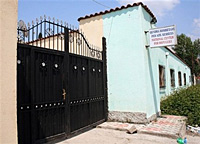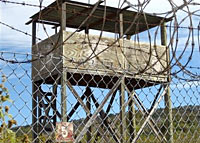




WASHINGTON—Five Muslim men from northwestern China, just released after five years in the U.S. prison camp at Guantanamo Bay, say they are finding freedom “like a celebration,” as they resettle in the only country to offer them asylum—Albania.
The men, all Chinese passport-holders, belong to the mainly Muslim ethnic Uyghur minority that accounts for most of the population in China’s northwesternmost Xinjiang Uyghur Autonomous Region.
They were cleared last year of terrorism charges but had nowhere to go except back to China, which accuses them of belonging to a pro-independence Uyghur group, the East Turkistan Islamic Movement, which Beijing says has links to Osama bin Laden’s al-Qaeda.
“We have been waiting for a year for our freedom, but no government wanted to take us in. That was the most difficult thing for us, being innocent but still in prison,” Ababehir Qasim, 37, said in a telephone interview from Albania, where the men were resettled last week.
“After waiting for a whole year we learned that Albania had agreed to take us as political asylees, and suddenly everything we had been through was forgotten. It was like a celebration for us,” Qasim told RFA’s Uyghur service.
“We feel that this is a celebration for all the Uyghur people, and we are so delighted.”
We have been waiting for a year for our freedom, but no government wanted to take us in—that was the most difficult thing for us, being innocent but still in prison,
“For more than four years we couldn’t contact anyone outside, couldn’t contact our families,” he said. “After that, the most difficult time for us came after the decision last May 9 that we were innocent.”
Many Uyghurs, who twice enjoyed short-lived independence as the state of East Turkestan during the 1930s and 40s, are bitterly opposed to Beijing’s rule in the northwestern region of Xinjiang.

“Thank God, we are very well, we are so happy, we are healthy and free,” Qasim said. “We are also grateful that our Uyghur brothers share our joy. Some of our Uyghur brothers have been contacting us. We are thankful for that.”
Asked what they would have done if China alone stepped forward to reclaim them, Qasim said the men would have sought to remain in Guantanamo, a Cuban-based U.S. naval base at which more than 10,000 people are thought to have been held.
“Sometimes we thought that if that were the only option, instead of going back to China we would be better off staying there [in Guantanamo]... Going back to China would more than double the suffering of the Uyghur people’s spirits.”
“So our people wouldn’t suffer, we thought that staying at Guantanamo would be better. The time it took to apply for political asylum became longer and longer, and we heard from our lawyer that the Chinese government was pressuring other governments not to accept us. Naturally, we tried to comfort each other,” he said.
Asked if the group had seen other prisoners in the camp, he replied:
“When we were in Prison #4, we are greeting to about 150 other prisoners. We could play ball together when we were in #4. We had some freedom. After they announced our innocence we were transferred [to another place]. They opened a new place called Iguana for just nine of us: five Uyghurs from Turkestan [Xinjiang], one Uyghur from Saudi Arabia, one Algerian, one Egyptian, and one Uzbek from Russia.”
“The nine of us were together, and if we went to the health clinic we could say hello to other prisoners. For various reasons we would meet other prisoners,” he said.
Qasim described the conditions in the prison camp as varying from one cellblock to another, with the 'worst' cells measuring two meters by 2.5 meters, with walls made of wire mesh.
In his camp, No. 4, he said 10 people shared a dormitory style room, and were manacled for journeys to interrogation rooms or to the hospital clinic.
"While in the cellblock, no one is chained up," Qasim said. "Every day we had exercise time and mealtime, when we would go out, and also we played soccer outside."
"Only when we were brought up to the interrogation room or the hospital clinic, would we be chained up while they were moving us. But after we were brought back to our cellblocks, there was no chain," he said.
The Uyghur group wasn’t subjected to torture during interrogations, he said. "We, the Uyghur people, did not have any difficulties with the interrogations. At the initial interrogations we told them that we left our homeland because we were against the Chinese government and we were seeking independence for our homeland. We told them the truth why we went to Afghanistan," he said.
"They have also recognized that what we have told them are the actual reality and told us ‘we did not go there to arrest you and you were arrested wrongfully. We will not repatriate you to China, and we shall grant you political asylum,’" he added.
“That is what they [were] saying, and we never had any problem or difficulties with our interrogations. There were times that the interrogators got bored from questioning us and left the room,” he said. “All the Uyghur guys over there are doing fine. They did not mistreat us…They knew our situation and understood the truth and announced that five of us were innocent in the end.”
“[It was] only because there were no countries to accept our political asylum request that we had to stay there for a year even after we were declared innocent,” Qasim said. “Recently, we were told very unexpectedly that we would be freed. On May 2, we got this news from the head people and the military lawyers over there. After three days, they moved us to Albania at 3 a.m.—they brought us here and made arrangements for us to stay here. We are grateful that we are here now.”
“This news came to us while we were trying to prepare ourselves for a longer patience in the prison camp. We were very pleased. We were extremely grateful for such a victory God brought us. We were so happy and grateful that the American government found a country to accept us,” he said.
“Even our brothers over there, even the other nationalists over there, were very happy that we were not sent back to China and we were set to be settled in another country.”
Boredom appeared to be the biggest difficulty confronting Qasim and his fellow prisoners.
“When we first got there, we had some religious, scientific, and some historical books in Uyghur at the first a couple of years. There were some Arabic books as well, but we had some religious, scientific, and some historical books in our own native language. There were some really good books....But in the last couple of years, they collected all of our books and took them away. All the religious and scientific books were taken away from us. Later, they gave some of the scientific books back to us."
"We used many different methods to deal with our boredom," he added.
The five men were detained during the U.S. invasion of Afghanistan following the Sept. 11 attacks. On May 6, Washington announced that the men had been sent to Albania for resettlement after officials concluded they posed no threat but could face persecution if they were sent back to China.
Other Uyghurs released from Guantanamo are Adil Abdulhakim, 32, and Ahter, 33, who along with Qasim are natives of Gulja City, Ili prefecture; and Ahmet, 33, whose birthplace is unknown, and Ayuphaji Mahomet, 23, from Kashgar.
Asked to describe their situation in Albania, Qasim said: “It is normal and things are going well. We have been here for three or four days now. When we arrived in the airport in Albania, someone picked us up by car and brought us to a refugee center.”
“We have been settled in a four-bedroom apartment, and the conditions here are not so bad. It has beds and a shower, they prepared new clothes for us, and we are eating at a common dining hall. The person who is responsible for looking after us said, ‘Whatever else you need, whatever else you want, just let me know.’ Their attitude toward us is positive. Maybe they have been told what happened to us.”
China wants the men repatriated for trial. On May 9, Chinese Foreign Ministry spokesman Liu Jianchao said the “suspects should be sent to China as soon as possible.” Liu described the men as “by no means refugees, but are terrorist suspects” whom the Chinese authorities of accuse of waging a violent campaign for an independent state of East Turkestan.
On Monday, the Chinese ambassador to Albania, Tian Changchun, called for the five to be repatriated immediately, saying they “fought on the side of the Taliban during the Afghan war, and this single fact can prove that they are nothing else but terror suspects.”
Beijing blames Uyghur separatists for sporadic bombings and other violence in the Xinjiang region. But diplomats and foreign experts are skeptical. International rights groups have accused Beijing of using the U.S. “war on terror” to crack down on nonviolent supporters of Uyghur independence.
The men’s attorney, in an interview with the Associated Press, criticized the United States for moving them to Albania, a country where he said it would be virtually impossible for them to assimilate.
Sabin Willett said U.S. President George Bush’s administration “has simply taken advantage of the good relationship with Albania to try to make one of its problems go away and I think that’s unfortunate.”
The five are being sheltered at a National Center for Refugees in the suburbs of Tirana and they have not been allowed to meet with reporters, Willett said.
Meanwhile, the British government’s top legal adviser called this week for the closure of Guantanamo Bay, which he called a symbol of injustice.
“The existence of Guantanamo Bay remains unacceptable. It is time, in my view, that it should close,” Attorney General Peter Goldsmith said in a speech in London.
“I believe it would also help to remove what has become a symbol to many—right or wrong—of injustice. The historic tradition of the United States as a beacon of freedom, liberty, and justice deserves the removal of this symbol,” he said.
Human rights groups have condemned Washington’s use of indefinite detentions without charge and want Guantanamo to close.
Original reporting by Omer Kanat of RFA's Uyghur service. Translation by Uyghur service director Dolkun Kamberi. Produced for the Web in English by Sarah Jackson-Han. Edited by Luisetta Mudie.